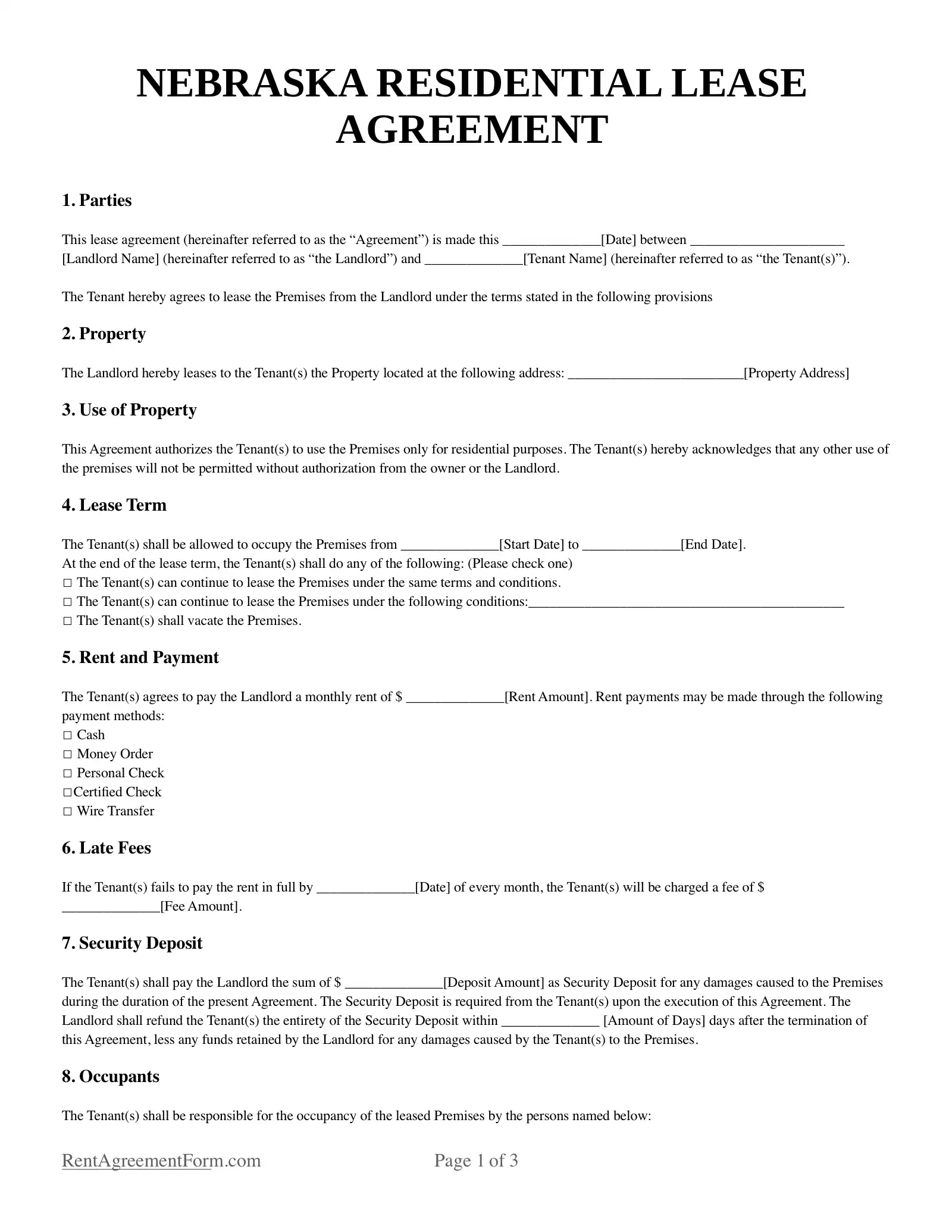Nebraska Residential Lease Agreement Form
Nebraska is known for its high standard of living coupled with affordable costs and low real estate prices. The state also has friendly local communities and great public schools, making it a great place to live for many.
Considering moving to Nebraska? You’ll need realtors, a simple rental application form, and a residential lease agreement form.
The standard Nebraska residential lease agreement contains the terms and conditions governing the rental of residential property for a set period in exchange for monthly rent. Before signing a lease agreement, the landlord and tenant should negotiate the terms to ensure that they are fair to both parties.
The lease agreement basically stipulates the rules, rights, and responsibilities of the landlord and tenant. The landlord must ensure that the room or property is safe to inhabit, maintain the property and utilities, include details about early termination, etc. It should also mention who has access to the property.
The tenant must sign the property to express their agreement with the terms, rules, and regulations set by the landlord.

Required Disclosures
There are certain disclosures that the landlord must make to the tenant before they move into the property. This information is vital and helps the tenant be aware of certain aspects of the place they’ll be inhabiting.
Here are the mandated disclosures for Nebraska:
Landlord’s Name and Address
The landlord must provide their full name and address to the tenant. A government photo ID should also be provided for their reference. This must be provided in writing before the tenancy starts and is applicable to all rental units in Nebraska (NE Code § 76-1417).
Lead-based Paint Disclosure
Based on federal law, landlords are required to disclose the harmful effects of exposure to lead-based paints. This is especially applicable to rental units and properties that were made during or before 1978.
After 1978, the usage of lead-based paints was banned throughout the nation, but some older homes still have them. Lead-based paint releases VOCs or volatile organic compounds into the air, which can be highly toxic if inhaled. People can suffer from organ failure and breathing issues from prolonged exposure.
The landlord must thus give the tenant a pamphlet about the dangers of lead-based paint that has been approved by the Environmental Protection Agency (EPA) (Lead-Based Paint Hazard Reduction Act of 1992 § 1018).
Rent Grace Period
Nebraska has no rent grace period that can be enforced by law. The landlord can decide to charge a late fee as soon as the rent comes in late. What counts as “late” can be drawn up in the residential lease agreement form. The landlord can also decide how much the late fee is.
Security Deposits
In Nebraska, the security deposit cannot be more than one month’s rent and the tenant must pay this amount before occupancy begins. This amount will protect the landlord in case there is damage to the property and also provides them with the assurance that the tenant will commence with the lease.
If the tenant fails to pay the rent on time, the landlord may deduct the rent from the security deposit. It can also be used for repairs should the property incur undue damage during the tenant’s lease.
While the security deposit is being held by the landlord, the landlord must keep the fund in a separate, insured account. The landlord cannot touch it unless there is unpaid rent or property damage.
If the deposit must be used for property repairs, the landlord must provide a breakdown of the costs. Once the lease ends, the landlord must return the deposit within 30 days after the tenant has left the property (NE Code § 76-1416).